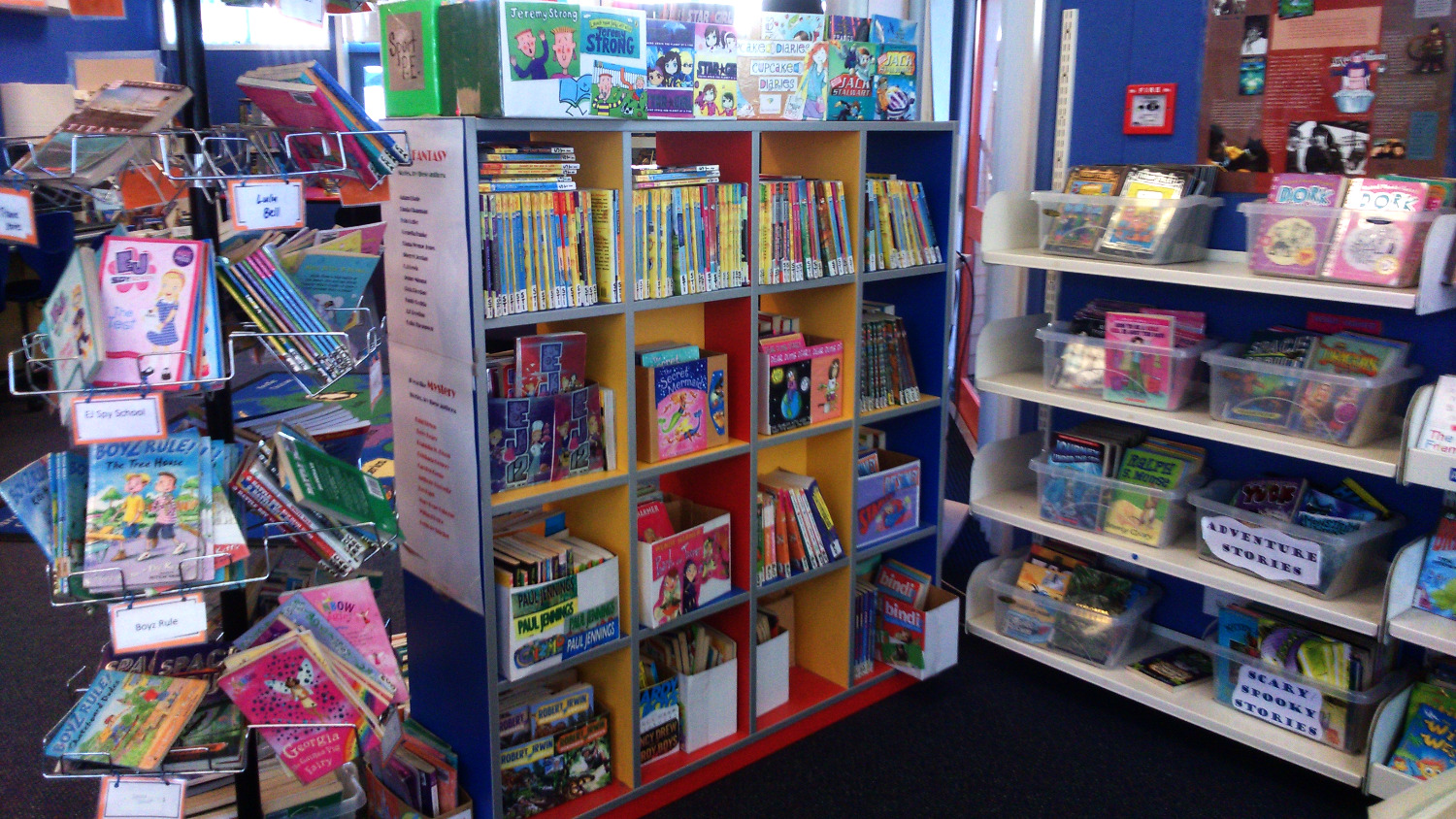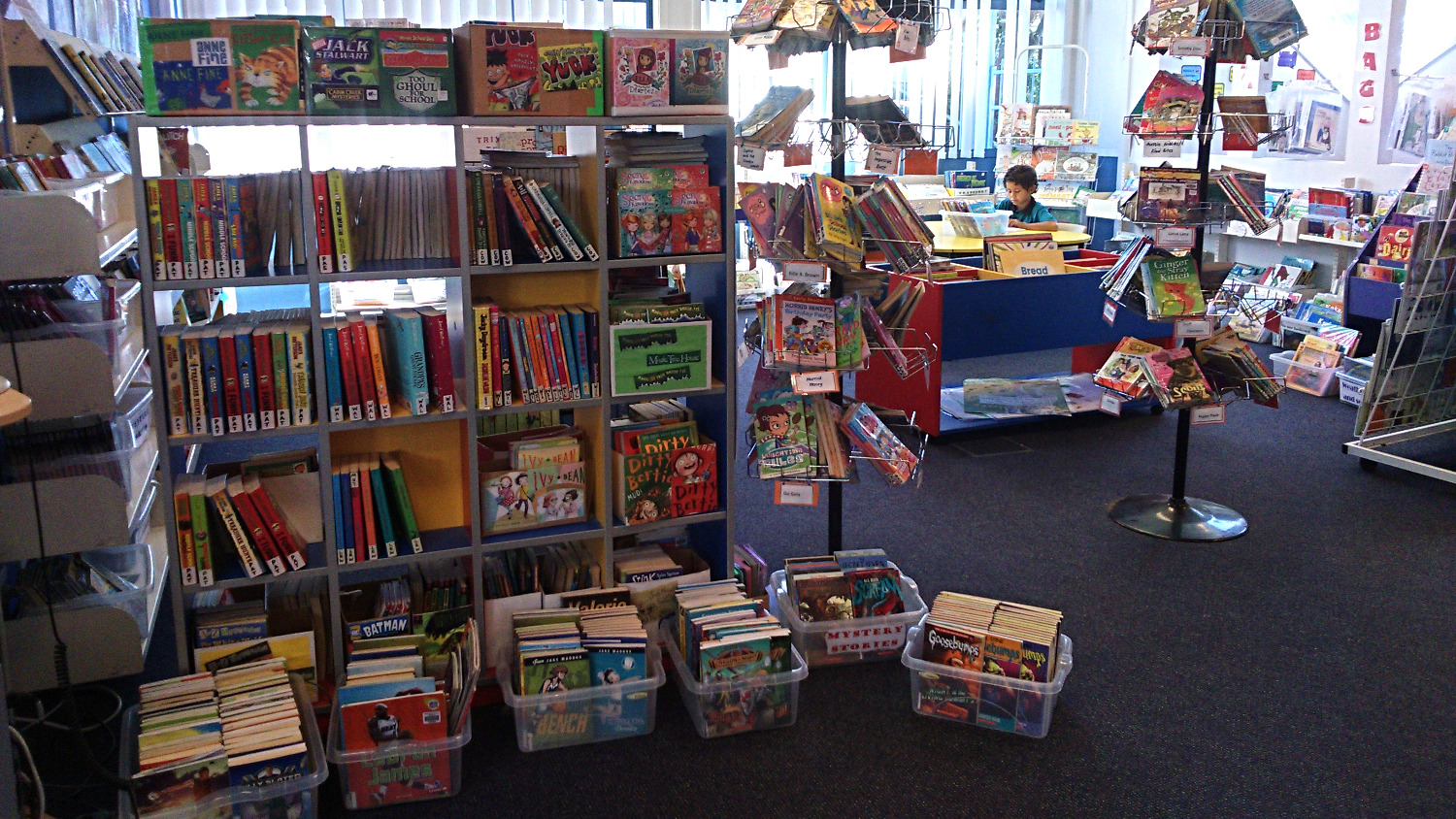New Zealand’s school librarians are passionate, engaged professionals who know how to get students of all ages and reading levels into reading. This, by Kimberley Atkinson, is the second of our monthly spotlights on inspirational school librarians.
I am the school librarian at Robertson Road School, a Decile One school located in the South Auckland suburb of Mangere, and I started here eight years ago. We currently have 558 students, mainly of a Pasifika background (Samoan, Tongan, Cook Island, Niuean, Tokeleaun, Fijian Indian) and about 10% Maori. We have five Samoan bi-lingual classes – the Gagana Samoa (the Samoan language) component drops as the students get older. It is a very vibrant community.

Children’s literature philosophy
I believe children need to be drowned in real paper books. Piles of them. Particularly in this community where children have little access to books and few visit the community libraries, we need to fill this gap at school.
They need a wide variety to choose from and with as much diversity as possible. Having their cultures recognised within reading material is extremely important. They need access to theatre based on literature (which is where Duffy Books plays such an important role at school), access to authors and illustrators, and people modelling the importance of reading and its benefits and the written word in all its varieties.
I’m lucky in that I have an incredible book budget, so can purchase any needs and wants all year round. If a child loses a book, they lose it. The school may or may not get reimbursed for the losses, but I feel the loss to a child’s literacy if we block them from borrowing anything else would have a much higher impact.
A typical day?
There is no typical day in the school library. You may plan for something (e.g. research skills) and the class does not turn up. There may be multiple relievers and if the class is young, they will require all the help they can get. I may be sent urgent photocopying to do. I may get an urgent request for books on random topics, journal articles, be interrupted while reading to a class for extra journal copies. I can have a class researching in the library. Students may turn up for shoes.
We have lower-than-average literacy levels, so many students need help whether online or with book research. This year we have moved to rotational classes where students themselves move from classroom to classroom. The majority of the learning is done before lunch, so the afternoons can be crazy; I can have 90 students browsing and issuing library books within 1 hour and 15 minutes. I also run a craft session at lunch twice a week (lunch for me? Um…).
My role encompasses all library responsibilities – book ordering and processing, teacher resourcing, computer networking with the library and associated IT things, KidsCan (all new students receive raincoats, and I follow up those children with clothing and food needs), Duffy (I co-ordinate every child receiving two free books every term to take home and keep – this is very cool), plus I co-ordinate assemblies and the ‘Caught Being Good’ programme. I am a Jack-of-all-trades really, as other school librarians will attest to! Sometimes I even hand out milk or watch the office. I’m sole charge, so if I am not here, there is no cover for me and everything builds up… I always have a backlog and one month into the new school term, I am just finishing 2016 work. The days can be crazy, with little free time to do any extra duties.
As school operation grants have been frozen, schools have less funds to employ extra support staff. Very occasionally I may get a parent helper, but we are without a PTA. I am also a Syndicate Team Leader, so am expected to help run sport/game sessions etc. Then I go home and attempt to do my two university papers I do every semester…
This truly is an awesome job, but it has challenges, particularly in a lower socio-economic area.
Library set-up
I am constantly moving my library around. Lately, I’ve been organising topic boxes where everything on a topic is placed into one container – for example ‘Seasons’. The box will have picture books, non-fiction, poetry around seasons. I started this after collating boxes for topics and also from our IOL (Intensive Oral Language), where we need multiple books on diverse topics such as popcorn, shopping, birthdays, picnics, the beach. Having everything on one topic in one place helps both students and teachers find material fast. So far we have seasons, celebrations, Matariki, Christmas, Easter, Halloween, space, gardening, healthy eating, transport, dinosaurs, maths, art, crafts,migration/refugees, language features (books on writing, nouns, authors etc), Bible stories.
I am finding that issues have increased, as the students can actually find things – being face-out in plastic bins or cardboard boxes is a lot more visual too.

Reading Together – a fantastic promotion
I organise and run the Reading Together programme for whanau. This is a nationwide reading programme, run by the Ministry of Education, which helps show families the importance of reading to and with family members. It is a four-week programme, with families attending weekly sessions at school. We open the library up for membership and families are able to borrow an unlimited amount of resources. The students’ reading is tracked from the beginning and we’ve seen some huge gains in reading levels at the end of the programme. It is really lovely watching the progress and even the relationships within families changing from the simple act of reading to and with their children.
Library organisations
I am a member of SLANZA, follow their GooglePlus community and undertake professional development opportunities with them. Their bi-annual conference is this July, which is always a not-to-be-missed opportunity for those involved in children’s literature in New Zealand. I am also a registered professional librarian under LIANZA where I complete my professional journal entry every two months of PD undertaken to keep current.
What is needed in the New Zealand publishing environment
There is an urgent need for more Pasifika-based material – I cannot over-state the huge, huge need from schools with Pasifika students for this material – whether in print or online. It needs to be written at very low levels as well. Clean Slate Press and Puriri Paddocks are doing an awesome job at filling this gap with new releases every year, but we need a lot more: myths and legends, daily life, fiction with Pasifika characters.
New Zealand also needs a lot more junior fiction to be published, and by this I mean very junior chapter books. Kyle Mewburn and Donovan Bixley with their new Dinosaur Trouble series have hit the mark with this, but again we need many more titles. David Riley writes sports biographies which are a great hit with my Pasifika boys.
I am constantly asked for big books on a huge variety of topics too, whether fairy tales, healthy eating, gardening, sustainability.
The last book I preached about
Jim’s Letters by Gly Harper still hits the mark for me three years after being published. I can still remember this arriving and sitting down to read to a year 7/8 class without really looking at it beforehand. I cried in front of all the students. This was great for them around our Anzac Day/Gallipoli topic and they realised the impact of war on those just not at the front of it.
Newer releases include David Riley’s Samoan Heroes and Tongan Heroes, which are just what we need – incredible Pasifika biographies with myths and legends thrown in. And I adore Oliver Jeffers’ A Child of Books and share it with everyone.

Kimberley Atkinson
Kimberley is a school librarian; working towards her last three university papers this year to finish a BA in history and education (it's only taken 28 years!); a crazy knitter and wool hoarder; avid reader, traveller, photographer, sewer, stitcher, scrapbooker... The family come somewhere in there!
Previous to her job at Robertson Road School, she worked in a high school library in England and also for the old Manukau City Council in a variety of roles, in a variety of branches.



